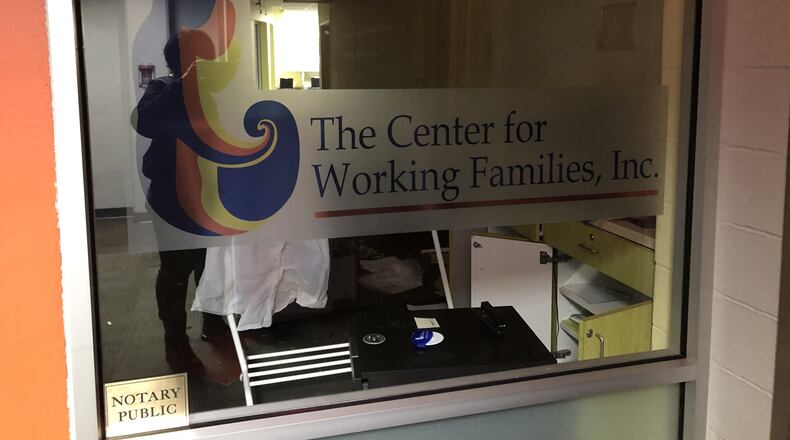Over 10 years, a basement nonprofit under contract with the city of Atlanta pumped millions of dollars into the cluster of struggling neighborhoods south of I-20. High-profile donors and the U.S. Department of Housing and Urban Development helped fund its mission to provide job placement, skills training and more.
What’s left of the Center for Working Families is a darkened office and questions from community members about what went wrong.
“They were there one day gone the next,” said Columbus Ward, a life-long Peoplestown resident and neighborhood activist.
In October, HUD’s investigations arm subpoenaed Atlanta for records detailing how the center spent parts of nearly $1.8 million from a federal HUD program that passed through the city’s grants office.
The center announced it ceased operations earlier in the year, but Ward said services for people in need had already diminished sharply in recent years.
The nonprofit struggled after its main donor, the Annie E. Casey Foundation, began to wind down its support in 2017, said former Center president and CEO Che Watkins. Private money for jobs programs is hard to come by, she said, and federal dollars have strict requirements that are complicated to administer.
“Everyone makes mistakes. But at the end of day we tried to do what’s best for the city of Atlanta,” said Watkins, who was at the agency for four-and-a-half years.
Watkins declined comment on the subpoena, saying she has not been contacted by investigators and no longer has program records tied to it.
The records sought by the subpoena related to HUD’s HOME Investment Partnerships Program, which provides grants to state and local governments for affordable housing programs in low-income households.
HOME funds typically help people rehabilitate their properties, finance the purchase and rehabilitation of rental housing or provide tenant-based rental assistance.
The U.S. Department of Housing and Urban Development’s Office of the Inspector General, which issued the subpoena, declined comment through a spokesperson. But a city spokesman told the AJC one of the center’s HUD projects funded through the city didn’t have adequate documentation for how the money was spent.
Millions in funding
The historic Atlanta neighborhoods of Adair Park, Capitol Gateway, Mechanicsville, Peoplestown, Pittsburgh and Summerhill became a magnet for nonprofit work after I-20 cut them off from the rest of the city and they experienced years of white flight and dwindling public investment.
None of these nonprofits had the profile or pedigree of the Center for Working Families, a one-stop shop for families in fragile financial health. Founded in 2009 with help from the Annie E. Casey Foundation, one of the nation’s premier philanthropies, the center’s community-centered approach to helping residents was part of Casey’s model in other cities.
The Casey foundation gave the center $11 million over the nonprofit’s lifetime.
The center also served as an incubator or fiscal agent for smaller neighborhood projects in areas such as public safety and community organizing, residents and neighborhood activists said.
At its height, some three dozen employees worked at the center, Watkins said. Established funders such as the United Way, the Kendeda Fund, and the Community Foundation for Greater Atlanta provided money for its projects, while federal agencies awarded grants to study crime and provide services to help formerly incarcerated residents and locals concerned with crime.
The center’s work was even cited in a 2011 White House report showing successful efforts for neighborhood revitalization.
Renovation contract
The program under OIG scrutiny is tied to a city of Atlanta-run effort to improve the health of residents while training them for jobs, according to a contract provided by the city of Atlanta in response to an open records request. Since 2011, the city has received millions of dollars from HUD to repair hundreds of older houses, which are at high risk for posing lead or other health hazards, or need weatherization.
The city contracted with the center to do the work.
A nearly $816,000 agreement adopted by Atlanta City Council March 20, 2017, expanded the renovations beyond those provided under prior grants, records state. As many as 25 homes owned and occupied by low- to middle- income residents were to be repaired over 13 months, costing up to $50,000 each.
The center paid rehab costs up front, then submitted receipts to the city for reimbursement, Watkins said.
“The work was done,” she said.
Still, HUD found this and other city spending were not allowed under federal rules because HUD lacked adequate documentation to justify the expenses, a spokesman for the city said in a written statement. City Council voted in October to pay HUD back for this and other programs.
The center was “unable to assist the City in gathering documents that could have validated the expenditures,” the statement said.
Watkins said the center gave all records to the city when the program ended.
Local tensions
Neighborhood politics and disagreements over priorities also created tension between residents and the center’s administrators, residents told The Atlanta Journal-Constitution.
Job seekers left the center discouraged, Ward said. Some did not qualify for programs because of their criminal histories. Others told him they could not meet the qualifications, or that providing required documentation was overwhelming.
“There was not a good relationship with the neighborhood, said Ward, who is president of Neighborhood Planning Unit-V, one of the city’s 25 citizens advisory councils.
Watkins said the nonprofit had to expand its service area outside NPU-V to attract more funding, and the problems these job seekers faced are common in federal workforce programs.
Chris Lemons, president of the Peoplestown Neighborhood Association, said he grew disappointed with the center after partnering with it on a $156,000 U.S. Department of Justice grant to study and improve neighborhood crime problems. The funding did result in a study, a local festival, and a mural to beautify an area near vacant lots that local kids used as a short cut.
But the center should have launched more ambitious programs, he said.
“I would say their impact helping the community and actually changing lives was minimal,” Lemons said.
‘Same old, same old’
The number of center staff members dwindled to 11 by the time it closed its doors last winter, Watkins said. Now that the Center for Working Families is gone, other organizations have had to take its place.
“It was nice to have an organization close by to point to,” said Jason Dozier, a Mechanicsville resident who used the center when it hosted meetings for the Turner Field Benefits Coalition, a local advocacy group that formed as the stadium was being purchased by Georgia State University. “Honestly, I think we’ve lost a lot of that since they’ve shuttered.”
Lemons, the Peoplestown neighborhood president, said he has grown skeptical of nonprofits that try to change a neighborhood. Despite a decade of work by the center and millions of dollars, residents of NPU-V continue to struggle.
“It’s kind of the same old, same old as what occurs in our NPU,” Lemons said. “People aren’t being served day by day.”
About the Author





